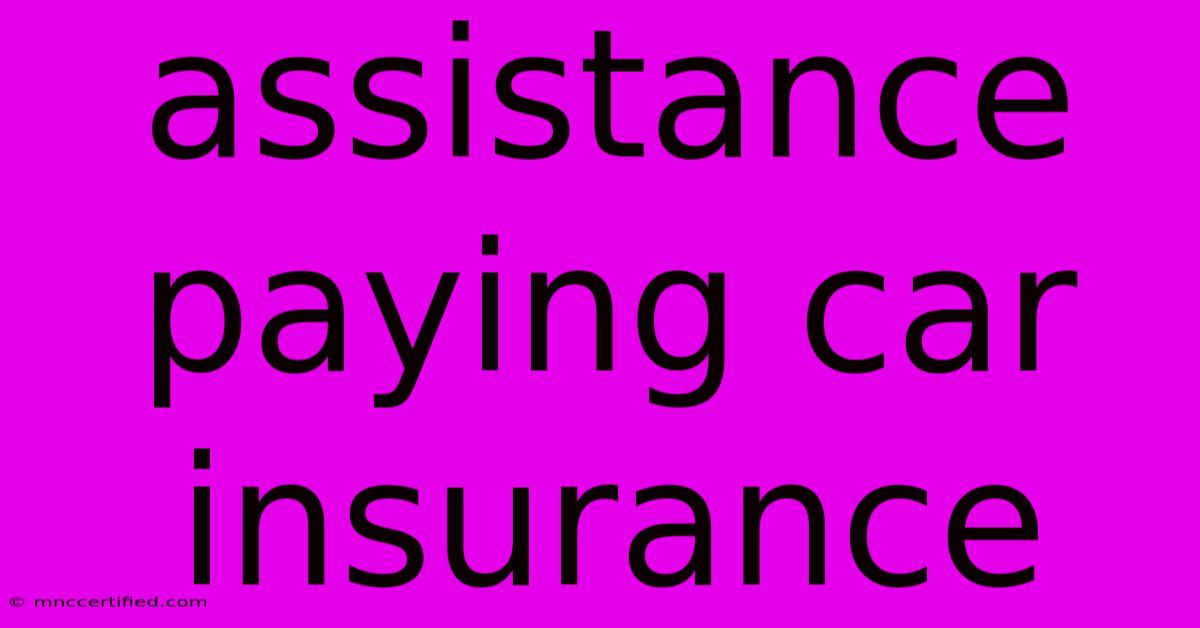Assistance Paying Car Insurance

Table of Contents
Assistance Paying Car Insurance: Finding Affordable Coverage
Finding affordable car insurance can feel like navigating a minefield. Unexpected expenses, job loss, or even a simple change in your driving record can make paying your premiums a significant struggle. Fortunately, several resources and strategies can help you find assistance paying car insurance, allowing you to maintain coverage without breaking the bank. This comprehensive guide explores various options available to ease your financial burden.
Understanding Your Options: Strategies for Affordable Car Insurance
Before diving into specific assistance programs, let's explore practical steps you can take to lower your insurance costs. These strategies can significantly reduce your premiums and make finding assistance easier:
1. Shop Around and Compare Quotes:
This is the most crucial first step. Different insurance companies offer vastly different rates. Use online comparison tools to obtain quotes from multiple providers. Don't just focus on the price; compare coverage options too. Make sure you're getting adequate protection for your needs.
2. Improve Your Driving Record:
A clean driving record significantly impacts your insurance premiums. Avoid speeding tickets, accidents, and other driving infractions. Defensive driving courses can sometimes lower your rates.
3. Bundle Your Insurance Policies:
Many insurers offer discounts when you bundle your car insurance with other policies, such as homeowners or renters insurance. This can lead to considerable savings.
4. Consider Your Coverage Levels:
Review your current coverage levels. Do you need full coverage, or would liability insurance suffice? Adjusting your coverage can reduce your premiums, but ensure you have adequate protection in case of an accident.
5. Increase Your Deductible:
A higher deductible means you pay more out-of-pocket in the event of a claim, but it can dramatically lower your premiums. Consider if a higher deductible is a financially viable option for you.
6. Explore Payment Options:
Inquire about payment plans from your insurance provider. They may offer options like monthly installments to make payments more manageable.
Seeking External Assistance: Programs and Resources
If cost-cutting measures aren't enough, explore these options for assistance paying car insurance:
1. Government Assistance Programs:
While there isn't a nationwide car insurance assistance program, some states offer programs to help low-income individuals or families afford car insurance. Check your state's Department of Insurance website to see if such programs exist in your area.
2. Non-profit Organizations:
Many non-profit organizations provide financial assistance to individuals facing hardship. Some may offer direct help with car insurance payments, while others might offer broader financial assistance that can be used to cover insurance costs. Research local charities and community organizations in your area.
3. Employer-Sponsored Programs:
Some employers offer employee assistance programs (EAPs) that can provide financial counseling and support, potentially helping you manage your car insurance payments. Check with your HR department.
Preventing Future Financial Strain: Proactive Steps
Once you've addressed your immediate financial needs, consider these strategies to prevent future difficulties with car insurance payments:
- Create a budget: Track your income and expenses to ensure you allocate sufficient funds for car insurance.
- Build an emergency fund: Having savings can act as a buffer against unexpected expenses, including car repairs or higher insurance premiums.
- Maintain your vehicle: Regular maintenance can prevent costly repairs that might strain your finances.
Conclusion: Finding the Right Solution
Finding assistance paying car insurance requires a multi-faceted approach. By combining cost-saving strategies with exploring available assistance programs, you can effectively manage your car insurance costs and maintain crucial coverage. Remember to thoroughly research your options and seek help from financial advisors or community resources if needed. Don't hesitate to contact your insurance company to discuss payment options and potential hardship programs. Maintaining adequate car insurance is vital for both your financial protection and legal compliance.

Thank you for visiting our website wich cover about Assistance Paying Car Insurance. We hope the information provided has been useful to you. Feel free to contact us if you have any questions or need further assistance. See you next time and dont miss to bookmark.
Featured Posts
-
Title Insurance For A Refinance
Nov 25, 2024
-
Slide Insurance Reviews Florida
Nov 25, 2024
-
Shenandoah Insurance Agency Inc
Nov 25, 2024
-
Air Ambulance Insurance Reviews
Nov 25, 2024
-
What Is Middle Market Insurance
Nov 25, 2024